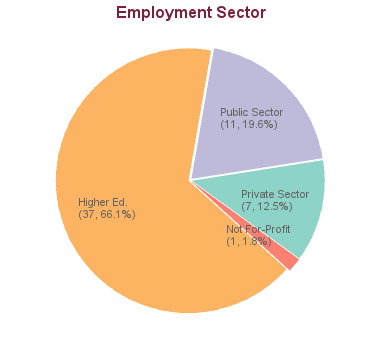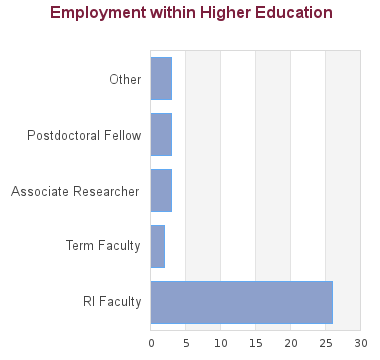
Lianping Ti
Job Title
Research Scientist
Employer
BC Centre for Excellence in HIV/AIDS

Review details about the recently announced changes to study and work permits that apply to master’s and doctoral degree students. Read more
The School of Population and Public Health offers a research-oriented PhD program that enables students with a masters degree to advance their knowledge and skills in epidemiological and biostatistical methods. Students will further their research training by applying these methods to independent thesis research under the supervision of a faculty member. Students can pursue thesis research in a wide variety of topics related to the health of populations and the delivery of health services.
The Faculty of Graduate and Postdoctoral Studies establishes the minimum admission requirements common to all applicants, usually a minimum overall average in the B+ range (76% at UBC). The graduate program that you are applying to may have additional requirements. Please review the specific requirements for applicants with credentials from institutions in:
Each program may set higher academic minimum requirements. Please review the program website carefully to understand the program requirements. Meeting the minimum requirements does not guarantee admission as it is a competitive process.
Applicants from a university outside Canada in which English is not the primary language of instruction must provide results of an English language proficiency examination as part of their application. Tests must have been taken within the last 24 months at the time of submission of your application.
Minimum requirements for the two most common English language proficiency tests to apply to this program are listed below:
Overall score requirement: 100
Reading
22
Writing
21
Speaking
21
Listening
22
Overall score requirement: 7.0
Reading
6.5
Writing
6.5
Speaking
6.5
Listening
6.5
Some programs require additional test scores such as the Graduate Record Examination (GRE) or the Graduate Management Test (GMAT). The requirements for this program are:
The GRE is required by some applicants. Please check the program website.
Deadline to submit online application. No changes can be made to the application after submission.
Transcript DeadlineDeadline to upload scans of official transcripts through the applicant portal in support of a submitted application. Information for accessing the applicant portal will be provided after submitting an online application for admission.
Referee DeadlineDeadline for the referees identified in the application for admission to submit references. See Letters of Reference for more information.
All applicants have to submit transcripts from all past post-secondary study. Document submission requirements depend on whether your institution of study is within Canada or outside of Canada.
A minimum of two references are required for application to graduate programs at UBC. Each graduate program determines the type of reference (e.g. academic, professional) and number of references they require which can range from 2 to 4. References should be requested from individuals who are prepared to provide a report on your qualifications for the program.
Many programs require a statement of interest, sometimes called a "statement of intent", "description of research interests" or something similar.
Students in research-based programs usually require a faculty member to function as their thesis supervisor. Please follow the instructions provided by each program whether applicants should contact faculty members.
Permanent Residents of Canada must provide a clear photocopy of both sides of the Permanent Resident card.
All applicants must complete an online application form and pay the application fee to be considered for admission to UBC.
| Fees | Canadian Citizen / Permanent Resident / Refugee / Diplomat | International |
|---|---|---|
| Application Fee | $116.25 | $168.25 |
| Tuition * | ||
| Installments per year | 3 | 3 |
| Tuition per installment | $1,875.34 | $3,294.66 |
| Tuition per year (plus annual increase, usually 2%-5%) | $5,626.02 | $9,883.98 |
| Int. Tuition Award (ITA) per year (if eligible) | $3,200.00 (-) | |
| Other Fees and Costs | ||
| Student Fees (yearly) | $1,144.10 (approx.) | |
| Costs of living | Estimate your costs of living with our interactive tool in order to start developing a financial plan for your graduate studies. | |
Applicants to UBC have access to a variety of funding options, including merit-based (i.e. based on your academic performance) and need-based (i.e. based on your financial situation) opportunities.
From September 2024 all full-time students in UBC-Vancouver PhD programs will be provided with a funding package of at least $24,000 for each of the first four years of their PhD. The funding package may consist of any combination of internal or external awards, teaching-related work, research assistantships, and graduate academic assistantships. Please note that many graduate programs provide funding packages that are substantially greater than $24,000 per year. Please check with your prospective graduate program for specific details of the funding provided to its PhD students.
This results in a net balance (any funding provided to the student minus tuition and fees) mean of $36,460 and median of $33,957.
All applicants are encouraged to review the awards listing to identify potential opportunities to fund their graduate education. The database lists merit-based scholarships and awards and allows for filtering by various criteria, such as domestic vs. international or degree level.
Many professors are able to provide Research Assistantships (GRA) from their research grants to support full-time graduate students studying under their supervision. The duties constitute part of the student's graduate degree requirements. A Graduate Research Assistantship is considered a form of fellowship for a period of graduate study and is therefore not covered by a collective agreement. Stipends vary widely, and are dependent on the field of study and the type of research grant from which the assistantship is being funded.
Graduate programs may have Teaching Assistantships available for registered full-time graduate students. Full teaching assistantships involve 12 hours work per week in preparation, lecturing, or laboratory instruction although many graduate programs offer partial TA appointments at less than 12 hours per week. Teaching assistantship rates are set by collective bargaining between the University and the Teaching Assistants' Union.
Academic Assistantships are employment opportunities to perform work that is relevant to the university or to an individual faculty member, but not to support the student’s graduate research and thesis. Wages are considered regular earnings and when paid monthly, include vacation pay.
Canadian and US applicants may qualify for governmental loans to finance their studies. Please review eligibility and types of loans.
All students may be able to access private sector or bank loans.
Many foreign governments provide support to their citizens in pursuing education abroad. International applicants should check the various governmental resources in their home country, such as the Department of Education, for available scholarships.
The possibility to pursue work to supplement income may depend on the demands the program has on students. It should be carefully weighed if work leads to prolonged program durations or whether work placements can be meaningfully embedded into a program.
International students enrolled as full-time students with a valid study permit can work on campus for unlimited hours and work off-campus for no more than 24 hours a week during academic sessions.
A good starting point to explore student jobs is the UBC Work Learn program or a Co-Op placement.
Students with taxable income in Canada may be able to claim federal or provincial tax credits.
Canadian residents with RRSP accounts may be able to use the Lifelong Learning Plan (LLP) which allows students to withdraw amounts from their registered retirement savings plan (RRSPs) to finance full-time training or education for themselves or their partner.
Please review Filing taxes in Canada on the student services website for more information.
Applicants have access to the cost estimator to develop a financial plan that takes into account various income sources and expenses.
60 students graduated between 2005 and 2013: 1 is in a non-salaried situation; for 3 we have no data (based on research conducted between Feb-May 2016). For the remaining 56 graduates:


These statistics show data for the Doctor of Philosophy in Population and Public Health (PhD). Data are separated for each degree program combination. You may view data for other degree options in the respective program profile.
| 2023 | 2022 | 2021 | 2020 | 2019 | |
|---|---|---|---|---|---|
| Applications | 37 | 41 | 52 | 40 | 42 |
| Offers | 16 | 21 | 22 | 22 | 19 |
| New Enrolment | 12 | 13 | 16 | 16 | 11 |
| Total Enrolment | 91 | 91 | 91 | 84 | 76 |
Students in research-based programs usually require a faculty member to function as their thesis supervisor. Please follow the instructions provided by each program whether applicants should contact faculty members.
These videos contain some general advice from faculty across UBC on finding and reaching out to a supervisor. They are not program specific.
This list shows faculty members with full supervisory privileges who are affiliated with this program. It is not a comprehensive list of all potential supervisors as faculty from other programs or faculty members without full supervisory privileges can request approvals to supervise graduate students in this program.
| Year | Citation |
|---|---|
| 2025 | Dr. Soe studied mRNA COVID-19 vaccine safety in groups underrepresented in pre-approval trials: older adults, children, and individuals with autoimmune diseases. Findings confirmed overall safety of mRNA COVID-19 vaccines. The results support evidence-based vaccination policies for vulnerable groups. |
| 2025 | Dr. Kerai-Sayani created survey in Urdu, in consultation with children in Pakistan, to assess their positive development and wellbeing. She also evaluated aspects of its accuracy and found that the survey effectively captures children's feelings and daily experiences, making it a valuable tool for monitoring- and developing programs to support their wellbeing. |
| 2025 | Dr. Hossain has developed big data predictive analytics and causal inference methods to address limitations in analyzing health administrative data. These methodological advancements have significant implications for the tuberculosis and epidemiology literature in minimizing bias, enhancing prediction accuracy, and generating robust inferences. |
| 2025 | Dr. Jeong found that treating hepatitis C infection with direct-acting antivirals significantly improves health beyond the liver, reducing risks of extrahepatic manifestations. Her research also highlighted the treatment's role in mitigating ethnic health disparities, emphasizing the need for early diagnosis, treatment, and equitable access to care |
| 2025 | Dr. Yusuf used health services data to investigate the period before the first recognized symptoms of multiple sclerosis. She identified different patterns of health service use and investigated the role of several biases. Her findings suggest that people with multiple sclerosis can be identified and treated earlier. |
| 2025 | Dr. Zhan studied biostatistical methods for improving clinical trial design in SPPH. He developed Bayesian adaptive approaches that allow trials to respond more effectively to accumulating data. His research enhances the efficiency and ethical conduct of trials, benefiting researchers and patients alike. |
| 2024 | Dr. Gemmell studied how urban environments impact children’s health and human rights, including the right to play. She developed and mapped a playability index across Canadian cities, identifying disparities in neighbourhood quality for children’s outdoor play. Her research advances assessment of urban environments for child health and well-being. |
| 2024 | Dr. Dau studied the impact of cervical cancer treatment on Ugandan women and their children. She found that a cervical cancer diagnosis leads to financial insecurity and challenges meeting caregiving and household responsibilities. This research provides evidence to expand cervical cancer screening and treatment programs in Uganda and globally. |
| 2024 | Dr. Okpani studied the impact of community and workplace factors, and mitigation strategies on the risk of COVID-19 infection among Canadian healthcare workers. This research enhances understanding of how protective measures in public health emergencies can promote workers wellbeing, reduce inequity, and support long-term health system resilience. |
| 2024 | Dr. Iyamu explored design and implementation factors influencing access to GetCheckedonline, BC's online service for STI testing. He found these services may not always increase testing access for historically marginalized populations if their design and implementation do not reduce the effort needed for testing and argued for empowering them to make informed testing choices through personalized education. |
The School of Population and Public Health (SPPH) offers both research-oriented and professional/course-based graduate programs.
Departments/Programs may update graduate degree program details through the Faculty & Staff portal. To update contact details for application inquiries, please use this form.

The metropolitan area is known for its diversity and UBC is one of the most international universities in Canada. This multicultural community means we have a wide range of restaurants, grocery stores, and events to provide a sense of belonging.